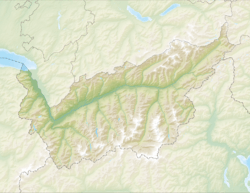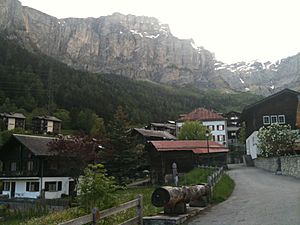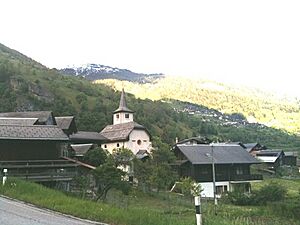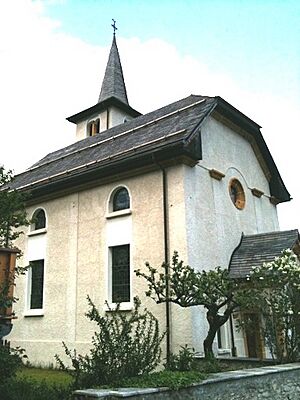Inden, Switzerland facts for kids
Quick facts for kids
Inden
|
||
|---|---|---|
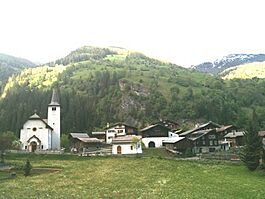
Inden village
|
||
|
||
| Country | Switzerland | |
| Canton | Valais | |
| District | Leuk | |
| Area | ||
| • Total | 9.74 km2 (3.76 sq mi) | |
| Elevation | 1,138 m (3,734 ft) | |
| Population
(Dec 2020 )
|
||
| • Total | 115 | |
| • Density | 11.81/km2 (30.58/sq mi) | |
| Postal code |
3953
|
|
| Surrounded by | Albinen, Leuk, Leukerbad, Mollens, Varen | |
Inden is a small town, also called a municipality, located in the beautiful Valais canton of Switzerland. It's part of the Leuk district. Imagine a quiet village nestled high up in the mountains!
Contents
A Glimpse into Inden's Past
Inden has a long history! The first time anyone wrote about Inden was way back in 1242. Back then, it was called Indes.
Inden's Geography and Landscape
Inden covers an area of about 9.9 square kilometers (3.8 square miles). A big part of this land is covered by forests. About 29.6% of Inden is forest, which is great for nature lovers!
A smaller part, about 8.5%, is used for farming. This includes pastures where animals might graze. Only a small amount of land, about 2.7%, has buildings or roads.
Inden is located on a high, flat area. It sits along the road that goes from Leukerbad to the famous Gemmi Pass. This makes it a scenic spot in the Leuk district.
Inden's Coat of Arms
Every town has a special symbol called a coat of arms. It's like a unique badge for the municipality. Inden's coat of arms shows a red wall with two arches. Above the wall, there's a black eagle with its wings spread out. On each side of the eagle, there's a six-pointed star.
People Living in Inden
Inden is a small community. As of 2022, it had about 103 people living there. Over the last ten years, the number of people living in Inden has changed a bit. More people have moved into Inden than have moved away.
Most people in Inden speak German. About 92.1% of the population speaks German as their main language. A few people also speak French or Italian.
The population is split evenly between males and females. About half the people are male, and half are female. Most people living in Inden were born in Switzerland. Many were even born right in Inden or in the same canton, Valais.
When it comes to age, about 18% of the people are children and teenagers (under 19 years old). Adults (20-64 years old) make up about 57.3% of the population. Older adults (over 64 years old) make up about 24.7%.
Most homes in Inden are single-family houses. In 2000, about 67.1% of the buildings were single-family homes. Many apartments in Inden are used for holidays or only at certain times of the year.
The chart below shows how Inden's population has changed over many years:

Inden's Economy and Jobs
In 2010, the unemployment rate in Inden was low, at 2.7%. This means most people who wanted to work had a job.
Jobs are often grouped into three main types:
- Primary sector: This includes jobs that get raw materials from nature, like farming. In Inden, 20 people worked in farming.
- Secondary sector: These jobs involve making things, like in factories or construction. Six people in Inden worked in construction.
- Tertiary sector: These jobs provide services, like working in shops, hotels, or restaurants. Eight people in Inden worked in services, especially in hotels or restaurants.
Many people who live in Inden travel to other towns for work. About 55% of working people used a private car to get to their jobs. About 17% used public transportation.
Religion in Inden
Most people in Inden are Roman Catholic. In 2000, about 79.8% of the population identified as Roman Catholic. A smaller number, about 7.9%, belonged to the Swiss Reformed Church. There were also a few people who belonged to other Christian churches or were Buddhist. About 9% of the population did not belong to any church.
Education in Inden
Education is important in Inden. About 45% of the adults in Inden have finished high school (called "upper secondary education" in Switzerland). Also, about 12.4% have gone on to higher education, like a university or a special college.
Most students from Inden attend schools outside the municipality. This means they might travel to nearby towns for their classes.
Images for kids
See also
 In Spanish: Inden para niños
In Spanish: Inden para niños
 | John T. Biggers |
 | Thomas Blackshear |
 | Mark Bradford |
 | Beverly Buchanan |




